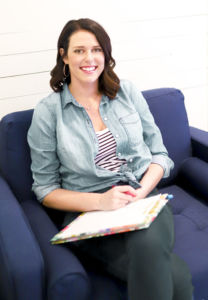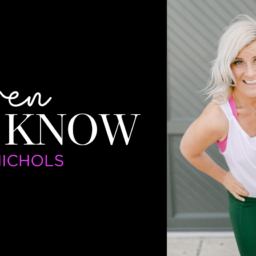
How many times have you opened your phone and read about the latest healthy living fad or best foods to eat to lose weight? It is so easy to do with social media and instant Internet access at our fingertips. However, not all of the people who share nutritional-related content are licensed to do so. Registered Dietitians (RD) earn accredited degrees in Nutrition and take exams to gain licensure in order to practice and work with clients.
Currently, in the state of Indiana, there are 2,136 Registered Dietitians and Registered Dietitian Nutritionists based on data from the Commission on Dietetic Registration. An RD can work with patients from all walks of life to help them navigate their understanding of food and nutrition.
It should be noted that not all work around nutrition is based on someone losing weight, but also understanding food and creating healthy relationships with what we put in our bodies. When looking for help and advice in the nutrition space it is always important to check the credentials of your therapist and find someone you feel comfortable and safe with.
To that end, here are some insights and tips from five local female registered dieticians, so whether you are working to repair your relationship with food, beginning your nutritional journey, or just curious about the work dietitians do, this article is for you.

LAUREN REIKER, RD, LD
PRACTICING DIETITIAN SINCE 2013
RENOVATEYOURPLATE.NET, @LAURENRIEKER.RD
What led you to this career?
An *unhealthy* obsession with nutrition and exercise led me to seek a career in food and/or nutrition. I didn’t know what a dietitian was until my high school chemistry teacher, Mrs. Dickerson, mentioned it to me. Ironically, while visiting Ball State the tour guide was a dietetic student. I was able to hear about her classes and career goals, and after talking to her, I knew that’s what I wanted to do.
What keeps you motivated?
There are so many aspects of my career that keep me motivated. Providing weight inclusive care to our Indianapolis community is probably my biggest motivator. There are very few treatment options for those struggling with their relationship to food so being one of the only outpatient options keeps me in this work. Additionally, being able to provide other dietitians the ability to work in a private practice is also very motivating for me. I am inspired by my team and clients every day to keep going.
What are one or two things you want your clients to know?
I want my clients (and everyone else) to know that I am not the expert of their bodies. Actually, no medical professional is. We have the ability to decipher evidence-based medicine, but at the end of the day, each person is the expert of their own body.
What is one piece of advice for someone either new to nutrition or someone who may be struggling to stay motivated?
The best advice that I have is to recognize that there is always more to learn. The learning never stops and as long as you can keep this in mind, you will make a great clinician. I think accepting this takes the pressure off of feeling like you have to know everything. Learning new information is a great way to stay motivated!

JESSICA MCALLISTER, RD
PRACTICING DIETITIAN FOR 17 YEARS
JMCALLISTERRD.COM, @NUTRITIONISTAJESS
What led you to this career?
When I was in college, I took a nutrition class as an elective for pre-medicine. I was hooked! I loved the application of food to medicine and wanted to learn more about how to use food to improve health.
What keeps you motivated?
My motivation stems from the fact that I offer an opportunity for people to become healthier and live in optimal health through food. I’ve had the fortune to work with hundreds of people helping them change their diets to live healthier lives. I consider that a blessing.
What are one or two things you want your clients to know?
I have talked to a lot of people that want to improve their diet and health for a number of reasons, but it seems that life gets in the way of that. I want my clients to know that creating a personalized, healthy diet looks different for everyone. With an overabundance of nutrition information right at our fingertips, it’s a challenge to know what a healthy diet really looks like and how to change yours to ensure you are heading on the right path to wellness.
The fact is that nutrition is personalized. The first step in becoming a “Nutrition B.O.S.S.” is to realize what works for some may NOT work for you. Stop comparing your wellness walk with others. There’s no such thing as resilience when it comes to our physical health. We sacrifice our physical health to cater to emotional relationships. We have the ability to make time and find money for whatever we find valuable in life. Value your health!
The second step is to accept the reality that you may (or may not) need some support in determining what will work for you. If you’re not willing to give up that comfort food or weekly calorie-ladened dinners out, you must be willing to accept the risk and results that accompany those foods/eating styles. Ditching the “I’m going on a diet” mentality and adopting an “I’m changing my lifestyle” mentality will make healthy eating doable, delicious, and much more rewarding. Changing your diet isn’t about being happy; it’s about being the physical person you’re meant to be. Reprogram yourself for better because you deserve it!
What is one piece of advice for someone either new to nutrition or someone who may be struggling to stay motivated?
Until you find a good reason to lose the weight and get fit, you’ll keep riding the same cycle of going hard and going home. What or who motivates you? Is it your current health? Your energy levels? Do you have “sick days” more often than you like? Do you want to play with your kiddos more? Be a better parent, coworker, friend, person?
The key to sticking to your goals and accomplishing the mission is to find what drives you. Not only should you find it but keep it in your front sights. Find the image that represents the mission. Tell the people you trust that mission. Tell yourself that you are important, strong, and capable enough to achieve the mission. Last, but never least…make the mission a priority. Until you get it in your head that, by any means necessary, I WILL accomplish my goal, the cycle WILL continue.

MEGAN MILLER, MS, RD, LD
PRACTICING DIETITIAN SINCE 2017
@SERENITYNUTRITIONCO
What led you to this career?
When I started college, I thought I wanted to be a nurse but quickly realized that was not the field for me. An older student introduced me to dietetics and I never looked back. I have always had an active lifestyle and enjoy helping people which makes nutrition a good fit.
What keeps you motivated?
Seeing my clients improve their relationship with food and their body is a big motivation to continue this work. The work we do is hard, but helping people break free from diet culture restraints and live a life not consumed by negative food thoughts is so rewarding. I also work closely with women dealing with Polycystic Ovary Syndrome (PCOS). These women do not have many resources to turn to and I am motivated to provide them with more evidence-based information.
What are one or two things you want your clients to know?
I want my clients to know that they can trust their bodies. We are constantly berated with food rules and messages that tell us what to eat and when to eat it. Eating food we enjoy does not have to be followed by guilt and shame. We all deserve to enjoy food!
What is one piece of advice for someone either new to nutrition or someone who may be struggling to stay motivated?
You don’t have to tackle everything at once! If you are wanting to create healthier habits, start slow and small. This might be as simple as eating more regularly throughout the day. These small steps will create sustainable changes over time.

KATIE HAKE, RDN, LD
PRACTICING FOR SIX YEARS
KATIEHAKE.COM, @KTHAKE
What led you to this career?
I started my career as a personal trainer and fitness instructor while studying to become a dietitian in college. I always knew I wanted to help people, so food and movement felt like a natural fit. I struggled with an unhealthy relationship with food and fitness early in my career which led me to a non-diet approach with my private practice.
What keeps you motivated?
I am motivated by seeing the “aha” moments that my clients and community have when they realize they can actually enjoy food, feel empowered with movement, and have true confidence in their body at any size. I’m also motivated by my nieces and other young people in my life. I don’t want anyone to experience the shame and wasted headspace around dieting that I once did. I truly pray and believe the future will be different for young girls when it comes to food and body image.
What are one or two things you want your clients to know?
I want my clients to leave each session knowing that they are valuable, worthy, and deserving of self-love and respect at any size, especially today, even if that’s larger or smaller than they were in the past. I want them to know that they are capable of rewriting their story.
What is one piece of advice for someone either new to nutrition or someone who may be struggling to stay motivated?
I would challenge someone to ask themselves their WHY for making change … and keep asking why. If it’s weight loss — why? More energy — why? When we can get to the root of how we want to feel, it can help us to simplify the next best step

ASHLEY THOMAS, MS, RD, LD
PRACTICING FOR TWO YEARS
What led you to this career?
After receiving my master’s degree, I worked as a health educator. As part of this job, I did biometric screenings; blood pressure, blood glucose, etc… I found myself doing a lot of nutrition counseling and I wanted to learn more about nutrition. I also love to cook and I enjoy the science behind food as well.
What keeps you motivated?
Knowing that I am a part of a very small percentage of dietitians who are African American. I am able to inspire and reach a group of people often overlooked when it comes to nutrition and how it relates to health. This is very important to me because minority groups are often blamed or just told about their susceptibility to various diseases, but often aren’t told how to make dietary changes in a way that relates to them specifically.
What are one or two things you want your clients to know?
When I talk to people about nutrition, I make it relatable. I tell them about my personal struggles and that even though I am a Registered Dietitian, my diet isn’t perfect.
What is one piece of advice for someone either new to nutrition or someone who may be struggling to stay motivated?
It’s okay to “mess up,” nutrition doesn’t have to be complicated. Making simple changes is the best way to go. It’s hard to go “cold turkey” when giving up certain foods, so if you mess up one day, that’s okay … tomorrow is a new day!
Jalysa King is Indy Maven’s Sales Maven as well as a freelance writer in Indianapolis who loves all things healthcare and storytelling.
All of our content—including this article—is completely free. However, we’d love if you would please consider supporting our journalism with an Indy Maven membership.








